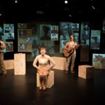Crime Does Not Pay is an American comic series that was published in the 1940s, launching the crime genre, as the first ‘true crime’ comic book series. The series was illustrated by Bob Wood and George Tuska with the assistance of others and was usually narrated by “Mr Crime” a ghost-like character in a top hat. This comic book series and Bob Wood, in particular, is the focus of a world premiere musical Crime Does Not Pay by Downstage Theatre and Forte Musical Guild, with support from Hit & Myth Productions. Upon first glance, it’s understandable why creators David Rhymer and Kris Demeanor would be interested in creating a musical about this comic series. There are questions about censorship, there is a whole volume of illustrations to play around with and Bob Wood was a dark and sinister character himself. But the production is devoid of empathy, for most of the characters and the audience winds up leaving feeling empty.
The musical features the entire cast in a band - Mr Crime and The Crimettes - on stage. The mascot of the production, Mr Crime (Kris Demeanor) provides commentary throughout the production but doesn’t really narrate the performance. He’s more a character in the background who is looking for the perfect crime. Band members play their parts and sing solos on an innovative set design by Anton de Groot, where the set is like lego, as it all fits together and comes apart to be wheeled around as a table or a chair. Mr Crime introduces the main character, Bob Wood (Devin MacKinnon) a struggling illustrator who is trying to sell his work, but publishers don’t really want what he’s selling. He then meets Violet Page, (Jamie Konchak) a singer at a bar who becomes his inspiration for his illustrations. He depicts her face when he draws women. This fact is glossed over at first, but it becomes quite relevant later when Wood proposes a true crime comic series to his boss Marvin Shade (David Rhymer). As ‘Crime Does Not Pay’ gains in popularity, it becomes the target of Dr Eleanor Flood’s (Lennette Randall) campaign against comic books. She believes that the content in the strips leads to violent behaviour amongst youth. As her campaign gains momentum, Wood becomes more despondent and he and Violet argue more. The musical concludes in an act of violence and Mr Crime and The Crimettes sing the production to its conclusion.
The band has some strong voices, especially Selena Wong, who is a member of the ensemble and plays keyboard and percussion. Konchak is vivacious as Violet, and her voice matches the jazz-lounge feel of the music while MacKinnon also has great musical talent. Rymer is wooden as Marvin Shade and he says his lines with very little emotion and Randall is flat in most of her singing and her song lyrics were hard to hear. It meant that lots of the character motivations and storytelling were lost in the words of the songs. The projection design of the various comic strips by Amelie Scott is impressive though and in conjunction with de Groot’s set design, it gives the production an innovative edge. Deitra Kalyn’s costume design also has an artistic touch, with cuffs and lapels highlighted in black and white, it allows a ‘sketch’ feel.
But there is coldness in how the production deals with its content, especially when its content is comics that depict in detail, violence and murder. The audience doesn’t feel genuine attachment to Bob Wood, he has a certain darkness to him. It’s almost like he enjoys the rape and murder that he illustrates. The real warmth comes from Kochak as Violet, but she isn’t the main character. She isn’t who the story is about. We follow Bob and this darkness and how it takes over him, especially when he guzzles alcohol. We are exposed to the poison in his mind and this comes to a head when Violet points out that the violent images in his comics always have her face. The production exposes the audience to this morbid tale, fully depicted with music and lyrics such as ‘I don’t want you weak, I don’t want you equal,’ and flashes comics full of gruesome violence, mostly against women and never says anything about the overarching theme in the end. Demeanor just croons about it not being a perfect crime. It makes for a production that is without connection and leaves the viewer feeling empty.
There is a line in the musical, spoken by Dr. Eleanor Flood, where she speaks about freedom of speech with no responsibility. This resonates for the production, as the creators produce songs about violence, murder and torture without, in the end, making any commentary on it. It might be the comic book in a musical on stage but there is no value added in the production.
Downstage and Forte Musical Guild’s presentation of Crime Does Not Pay runs until March 11th. More information is available online.
Photo Credit: Citrus Photography
Related Posts
| Tweet |
|








